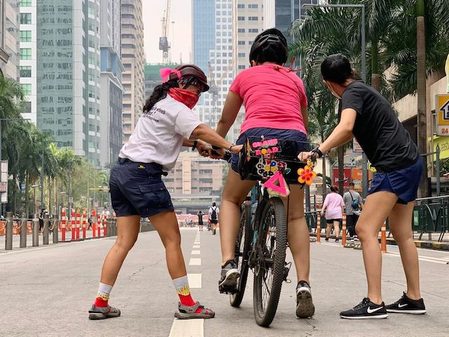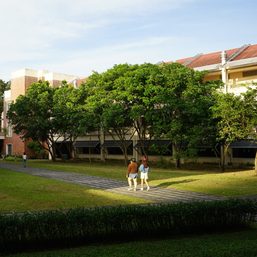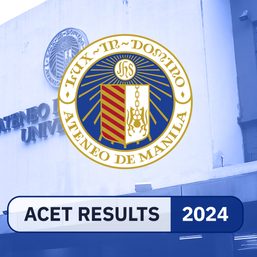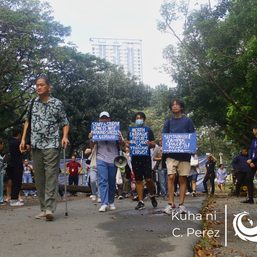SUMMARY
This is AI generated summarization, which may have errors. For context, always refer to the full article.
![[OPINION] Cutting trees in our Ateneo backyard](https://www.rappler.com/tachyon/2024/01/ateneo-trees-january-10-2024.jpg)
I have been a teacher in Ateneo de Manila University for several decades, since 1983. My service to the university was broken only when I taught full time at the University of the Philippines College of Law and when I did an overseas stint in the United States. But since 2006, I have taught continuously at the Ateneo School of Government (ASoG), Ateneo Law School, and in the Departments of Philosophy, Political Science, and Environmental Science in what used to be called the Loyola Schools).
In the last two decades, I have also held office in two locations in the Katipunan campus of Ateneo – in the Pacifico Ortiz Hall where ASoG is located and the Manila Observatory where I am Associate Director and director of the Klima Center.
It would be correct to say that the Ateneo campus is my backyard, shared with many others. And that is why I care, like many others, about the cutting of trees. Usually, the NIMBY (anywhere but not in my own backyard) phenomenon is not a practice to be emulated.
It is wrong to care only about your backyard. One should always be concerned about what happens in the bigger society, indeed for environmental issues, in all things that affect the planet.
Fortress or garden?
This is why I care about what happens to trees on the Ateneo campus. This is not about my university. This is about all green spaces in this country – in universities, in public places, and even in private lands with many trees, in watersheds, and in protected areas – which are threatened by development aggression.
Some might think that the protesters to the expansion of a parking lot, which is the reason for cutting the trees, are making a mountain out of a molehill. But as the papal encyclical Laudato Si’ explains vey well, everything is interconnected; it’s like dominoes, we make this fall and every domino will fall. And we will mirror everything unsustainable in our society.
The broader question here is whether we want an Ateneo de Manila that is transformed by an unsustainable society or one that transforms society by being an example to other institutions, a beacon of Laudato Si’, praising God through its beauty.
I phrase it this way: do we want a Fortress Ateneo or a Garden Ateneo that welcomes even outsiders and is hospitable to all (people and species) of parks and green spaces and not parking lots? The same question could be asked about our world itself. As Pope Francis laments in Laudato Si’:
“Nowadays, for example, we are conscious of the disproportionate and unruly growth of many cities, which have become unhealthy to live in, not only because of pollution caused by toxic emissions but also as a result of urban chaos, poor transportation, and visual pollution and noise. Many cities are huge, inefficient structures, excessively wasteful of energy and water. Neighborhoods, even those recently built, are congested, chaotic, and lacking in sufficient green space. We were not meant to be inundated by cement, asphalt, glass, and metal, and deprived of physical contact with nature.”
Invasive trees argument
This is not about cutting invasive trees for safety and other reasons. That is a diversion. Of course, theoretically, we can do that as that is justified by science, but we know that is not the reason why the trees are being cut. The trees are being cut to expand a parking lot and to accommodate more cars.
Knowing this, it is appropriate to say that we are cutting trees for cars. We are exchanging dirt and mud, which has environmental and biodiversity value, for pavement, for concrete, and for more pollution.
As a colleague who also teaches and works on sustainability issues in Ateneo told me, a tree, invasive or not, is still a tree.
It is also not right to condone the Department of Environment and policy of replacing grown trees with seedlings that rarely grow to mature trees, because they are not planted in the right places and not protected. Planting seedlings is profitable, but is not managing or protecting them to become forests, which is difficult and expensive.
This is why the National Greening Program is a big failure even after billions spent. Replacing grown trees with seedlings is a practice for corporations who want to cut trees for malls, mines, resorts, subdivisions, etc. This is corporate greenwashing, which a Laudato Si’ university should not emulate.
Inclusive mobility
The answer is obvious. A garden, of course, a small park, with maybe a well-designed bike rack. In fact, the campus will lose nothing if we give up the existing car slots. The lesser cars the campus can accommodate in its parking lots and roads the better for us.
The solution to our car problem in the campus, in fact in all of Metro Manila, is to adopt the principles of inclusive mobility. Ironically, there are many of us in Ateneo that are experts in this approach, which is also consistent with a vision of a garden world.
MyyASoG colleague Dr. Segundo Romero way back in 2015 identified key principles of that approach. I emphasize a few of that below:
- A transport system that works for the poor and vulnerable. The test for inclusive mobility is not that the average person is mobile, but that even the poor and vulnerable are.
- A walkable, bike-able, accessible city. To move the city, every person should be able to carry himself, if not all the way, then part of the way. Everyone who can, must walk, bike, commute, and only as a last resort, take the car.
- Moving people, not vehicles. Those who have less in wheels, must have more in roads. Efficient and effective public transport must be the backbone of the transport system.
- Sharing information to increase connectivity and accessibility. Navigating through the city requires choosing between alternative paths, modes, and combinations. The more we know the feasible alternatives, the more efficient we travel.
- Making our neighborhoods more accessible to the rest of the city. We cannot expect the whole city to be hospitable to our travel intentions, if we keep the city out of our own neighborhoods.
- Changing mindsets and behaviors – the authorities’ as well as ours. Inclusive mobility is a set of conditions shaped by human intentions and behaviors – more of ours, and less of the authorities.
What Pope Francis says
When there are environmental conflicts, whether it is reclamation or mining projects or the cutting of trees to give way to malls, resorts, or parking spaces, I turn to the papal encyclical Laudato Si’.
I teach the encylcial in many Catholic schools and lecture about it frequently because Pope Francis’ reminders about our relationship with nature is good guidance in decision-making. Catholic universities must particularly mainstream this thinking in their actions.
Here are some excerpts from Laudato Si’ that are relevant to the cutting of trees to expand a parking lot:
- “If we approach nature and the environment without…openness to awe and wonder, if we no longer speak the language of fraternity and beauty in our relationship with the world, our attitude will be that of masters, consumers, ruthless exploiters, unable to set limits on their immediate needs. By contrast, if we feel intimately united with all that exists, then sobriety and care will well up spontaneously.” (Laudato Si‘, #11)
- “Because all creatures are connected, each must be cherished with love and respect, for all of us as living creatures are dependent on one another. Each area is responsible for the care of this family.” (Laudato Si’, #42).
- “The universe unfolds in God, who fills it completely. Hence, there is a mystical meaning to be found in a leaf, in a mountain trail, in a dewdrop, in a poor person’s face. The ideal is not only to pass from the exterior to the interior to discover the action of God in the soul, but also to discover God in all things” (Laudato Si’, #233).
We can do no wrong if we heed these wise words of Pope Francis. – Rappler.com
Tony La Viña teaches constitutional law at the University of the Philippines and several Mindanao law schools. He is former dean of the Ateneo School of Government.
Add a comment
How does this make you feel?
![[OPINION] Pope Francis’ ‘Laudate Deum’: Inspiring climate action](https://www.rappler.com/tachyon/2023/10/20231008-Laudate-Deum.jpg?fit=449%2C449)






There are no comments yet. Add your comment to start the conversation.